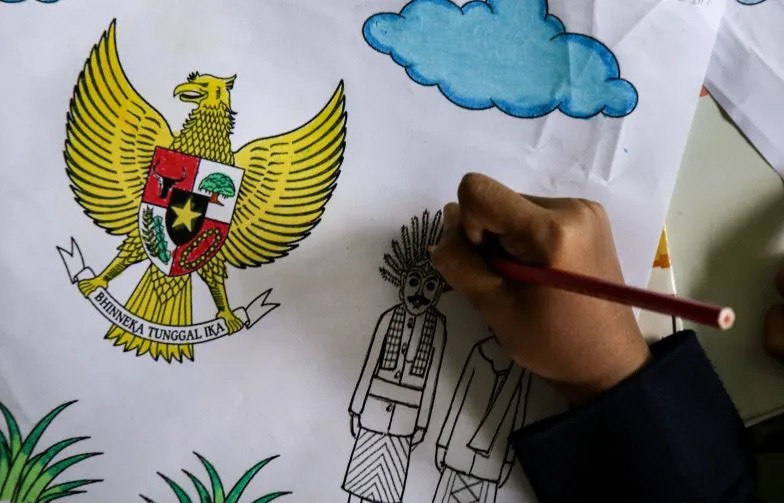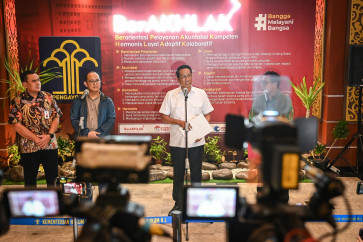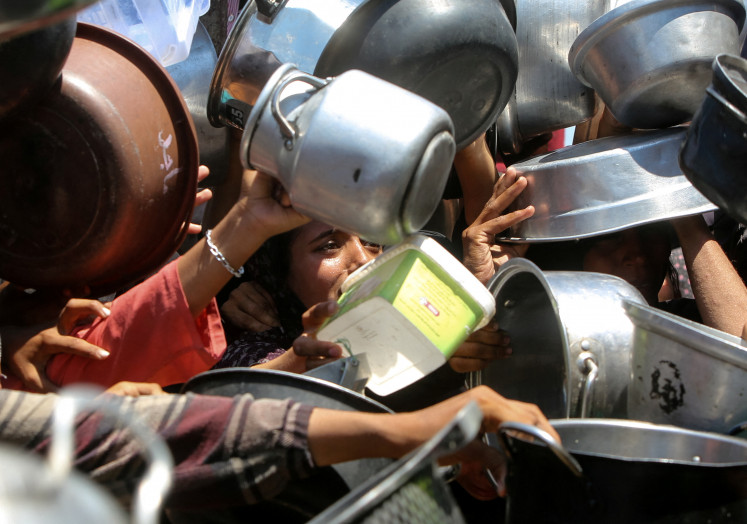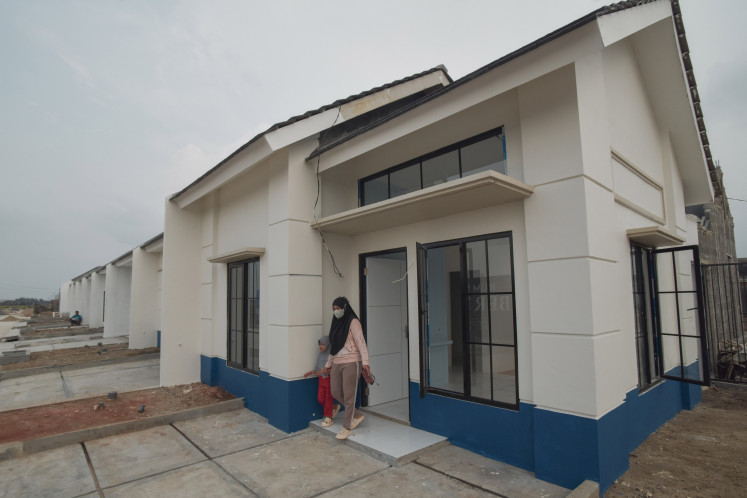Popular Reads
Top Results
Can't find what you're looking for?
View all search resultsPopular Reads
Top Results
Can't find what you're looking for?
View all search resultsThe ‘stupid-goddess’-izing of women and Pancasila
Even in the Reform era, the Islamization of Indonesian society has been a covert effort to set up a caliphate state, with a kind of Islamic "ibuism".
Change text size
Gift Premium Articles
to Anyone
W
hat is it about June that four of Indonesia’s presidents – the first, second, third and seventh – were born this month? Sukarno (1901-1970), was born on June 6, Soeharto (1921-2008) on June 8, BJ Habibie (1936-2019) on June 25, and Joko “Jokowi” Widodo (1961- ) on June 21.
Could it have anything to do with the fact that June 1, 1945 was the birth of Pancasila, our national foundational philosophy, and June is considered Pancasila month?
Many like to call Pancasila an ideology, but the five sila (principles) are more like ideals or values and a benchmark of our political ethics. They are: 1) belief in One God, 2) a just and civilized humanity, 3) the unity of Indonesia, 4) democracy guided by deliberations among representatives and 5) social justice.
According to Franz Magnis Suseno, a Jesuit priest and philosopher, Pancasila is an ideology that is capable of solving the challenges of a pluralistic nation, uniting various ethnicities, cultures and beliefs in Indonesia.
Can it also solve the issue of gender equality? This is the theme of a chapter I wrote for an anthology called Mythos Pancasila, initiated by Berthold Damshäuser, an Indonesian literature German professor at Bonn University, to be published next month by Regiospectra Verlag Berlin.
Why would an Indonesian literature professor be interested in compiling a book of 10 essays on Pancasila in German? Initially he had written about the language used in Pancasila, which he thought was a masterpiece. But then he and the co-editor for the Mythos anthology, Wolfgang Brehm, decided it would be a great idea to produce a book “that not only provides a general introduction to Pancasila, but also gives new answers to the question of what it is all about and what its essence, function and meaning are”.
I was asked to contribute a chapter. I said I would write on women, especially since the majority of contributors are men and none of them were writing about women or gender.
The title of my chapter is “Pancasila, ‘Perempuan’ and Patriarchy” (perempuan means girl or woman in Indonesian). Pretty pointed right? Well, why beat around the bush when this country is clearly still strongly patriarchal, resulting in persistent gender inequality with Indonesia ranking 85th out of 149 in the global gender gap ranking. According to the United Nations, Indonesia is the worst of ASEAN countries, with only Myanmar, Cambodia and Laos having lower rankings.
In my chapter I looked at the connection between Pancasila and gender ideology in Indonesian history from the revolutionary period to present-day Indonesia.
Before going into that, I should mention that Sukarno wrote a treatise on women called Sarinah, published in 1947. It is exceedingly rare that a head of state anywhere would focus specifically on the role of women, let alone write a book about it.
In the book, Sukarno criticizes most men who view women as dewi-tolol (half-goddess, half-moron) - put on a pedestal, but at the same time treated as if stupid. He exhorted women to be “revolutionaries” as he believed achieving independence would be impossible without women’s participation. And even after independence, the building of the state and nation could not be realized without women’s participation.
On gender relations, he said that women and men should struggle together as equals, like the two wings of a bird that cannot fly if both wings are not equally strong.
Considered progressive – a reflection of Sukarno’s socialist leanings – Sarinah could be considered to be a gendered articulation of Pancasila. While containing contradictions, Sarinah remains a remarkable piece of political scholarly work, rich with references and demonstrating a high level of gender awareness.
After Sukarno, no other Indonesian leader ever called upon Indonesian women to be revolutionary. It was domestication for Indonesian women all the way after that!
If there was the “stupid-goddess”-ization of Indonesian women, a similar phenomenon happened to Pancasila. It was conceived to provide the basis of an Indonesia that would be strong because of its belief in God, its pluralism, its humanism, its democratic spirit and its emphasis on social justice.
However, throughout all the different regimes, Indonesia’s politicians and leaders, even Sukarno himself toward the end of his presidency, betrayed Pancasila and with that the nation, as well as the women of Indonesia.
This betrayal became manifest during the period of Guided Democracy (1959-1966), when Sukarno had become a dictator, and had taken on multiple wives in his infamous polygamous marriages. He was no longer sensitive to the (economic) needs of the people or to the feelings of his wives.
Due to its openness, Pancasila very easily became a shape-shifting, rubbery ideology. Ideologies never exist in a vacuum, and Pancasila changed its hue, if not outright color, with each regime. In the Sukarno era, leading up to 1955 elections, nationalist parties used Pancasila against the Islamic parties.
This anti-Islamic stance by the nationalists may have been moved by party self-interest but it also had the effect of ensuring that Pancasila protected Indonesia’s pluralistic society as Bhinneka Tunggal Ika (Unity in Diversity), which was one of the original aims of Pancasila.
Soeharto’s New Order also adopted Pancasila as its state ideology but managed to transform it into a tool of oppression. According to historian Robert Cribb, “Pancasila’s prestige slumped when used by the authoritarian second president, Soeharto. What started as statements to stabilize became sentences to fracture”.
Sukarno's call for Indonesian women to be revolutionary is still very relevant for today's women, who since Soeharto's New Order regime (1966-1998) have been domesticated with the ideology of state ibuism (Suryakusuma, 1988, 2011, 2021), whereby women’s dependency on their husbands was idealized and formalized.
Even in the Reform era, the Arabization of Indonesian society has been a covert effort to set up a caliphate state, with a kind of Islamic ibuism. The hijab has become a new symbol of the social construction of Indonesian womanhood who are subjected to patriarchal values found in all Islamic schools and even state ones. There is a tendency to Islamize law, which gives rise to a series of new social constructions that are similar, perhaps even more oppressive, than those that prevailed during the New Order era.
According to feminist activist Eva Kusuma Sundari, “When Pancasila has passed the gender equality test, it can accommodate other groups as well, including religious and sexual minorities. Gender equality is often said to divide the issues of patriarchal society, especially related to ethnic, religious, racial and intergroup (SARA) subordination, which often has a discriminatory impact”.
So are both women and Pancasila really being “stupid-goddess”-ized? Women are called the “pillar of the nation”, and Pancasila declared sacred, but in reality both are merely used for the purposes of Machiavellian power politics.
But wait! Pancasila is a set of abstract ideals, while women are real. Historically, the Indonesian women’s movement has shown itself to be very resilient, becoming stronger with every blow and betrayal.
So to all you political leaders out there, commit to supporting women, let us be revolutionary, for the sake of our beloved Indonesia!
***
The writer is the director of the Gender and Democracy Center, LP3ES.










